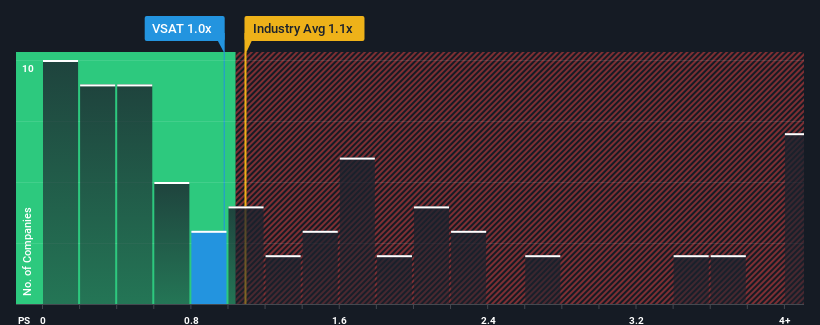- United States
- /
- Communications
- /
- NasdaqGS:VSAT
A Piece Of The Puzzle Missing From Viasat, Inc.'s (NASDAQ:VSAT) 33% Share Price Climb
Viasat, Inc. (NASDAQ:VSAT) shareholders would be excited to see that the share price has had a great month, posting a 33% gain and recovering from prior weakness. Unfortunately, the gains of the last month did little to right the losses of the last year with the stock still down 11% over that time.
Although its price has surged higher, it's still not a stretch to say that Viasat's price-to-sales (or "P/S") ratio of 1x right now seems quite "middle-of-the-road" compared to the Communications industry in the United States, where the median P/S ratio is around 1.1x. While this might not raise any eyebrows, if the P/S ratio is not justified investors could be missing out on a potential opportunity or ignoring looming disappointment.
Check out our latest analysis for Viasat

What Does Viasat's P/S Mean For Shareholders?
Viasat certainly has been doing a good job lately as it's been growing revenue more than most other companies. One possibility is that the P/S ratio is moderate because investors think this strong revenue performance might be about to tail off. If the company manages to stay the course, then investors should be rewarded with a share price that matches its revenue figures.
Want the full picture on analyst estimates for the company? Then our free report on Viasat will help you uncover what's on the horizon.Do Revenue Forecasts Match The P/S Ratio?
There's an inherent assumption that a company should be matching the industry for P/S ratios like Viasat's to be considered reasonable.
Taking a look back first, we see that the company grew revenue by an impressive 34% last year. The strong recent performance means it was also able to grow revenue by 47% in total over the last three years. Therefore, it's fair to say the revenue growth recently has been superb for the company.
Looking ahead now, revenue is anticipated to climb by 31% during the coming year according to the seven analysts following the company. With the industry only predicted to deliver 0.4%, the company is positioned for a stronger revenue result.
With this in consideration, we find it intriguing that Viasat's P/S is closely matching its industry peers. Apparently some shareholders are skeptical of the forecasts and have been accepting lower selling prices.
What Does Viasat's P/S Mean For Investors?
Viasat's stock has a lot of momentum behind it lately, which has brought its P/S level with the rest of the industry. While the price-to-sales ratio shouldn't be the defining factor in whether you buy a stock or not, it's quite a capable barometer of revenue expectations.
Looking at Viasat's analyst forecasts revealed that its superior revenue outlook isn't giving the boost to its P/S that we would've expected. There could be some risks that the market is pricing in, which is preventing the P/S ratio from matching the positive outlook. It appears some are indeed anticipating revenue instability, because these conditions should normally provide a boost to the share price.
Before you settle on your opinion, we've discovered 2 warning signs for Viasat (1 makes us a bit uncomfortable!) that you should be aware of.
If you're unsure about the strength of Viasat's business, why not explore our interactive list of stocks with solid business fundamentals for some other companies you may have missed.
New: Manage All Your Stock Portfolios in One Place
We've created the ultimate portfolio companion for stock investors, and it's free.
• Connect an unlimited number of Portfolios and see your total in one currency
• Be alerted to new Warning Signs or Risks via email or mobile
• Track the Fair Value of your stocks
Have feedback on this article? Concerned about the content? Get in touch with us directly. Alternatively, email editorial-team (at) simplywallst.com.
This article by Simply Wall St is general in nature. We provide commentary based on historical data and analyst forecasts only using an unbiased methodology and our articles are not intended to be financial advice. It does not constitute a recommendation to buy or sell any stock, and does not take account of your objectives, or your financial situation. We aim to bring you long-term focused analysis driven by fundamental data. Note that our analysis may not factor in the latest price-sensitive company announcements or qualitative material. Simply Wall St has no position in any stocks mentioned.
About NasdaqGS:VSAT
Viasat
Provides broadband and communications products and services in the United States and internationally.
Undervalued with mediocre balance sheet.
Similar Companies
Market Insights
Community Narratives




